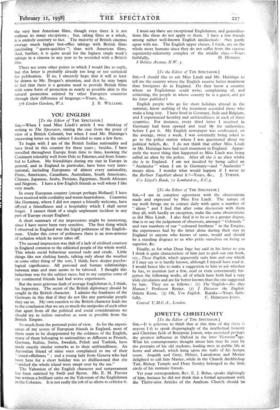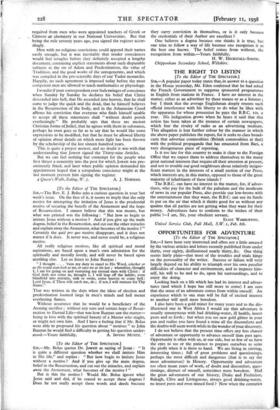JOWETT'S CHRISTIANITY
[To the Editor of THE SPECTATOR.] SIR,—It is grievous to think that at this time of day there is anyone 1:ft to speak disparagingly of the intellectual honesty and Christian faith of Benjamin Jowett, who exercised perhaps the greatest influence in Oxford in the later Victoriangage. What his contemporaries thought about him may be seen by the portraits of his old students, leading men in public life at home and abroad, which hang upon the walls of his lecture room. Asquith and Grey, Milner, Lansdowne and Morier delighted to call him Master, .while in the Church Archbishop Tait, Bishop Temple and Dean Stanley belonged to the little circle of his intimate friends.
Yet your correspondent, Rev. E. J. Bolus, speaks slightingly of him, because he did not think that a formal agreement with the Thirty-nine Articles of the Anglican Church should be
required from men who were appointed teachers of Greek or Chinese or chemistry in our National Universities. But that being the rule seventy years ago, you signed the register accor- dingly.
Men with no religious convictions could append their names easily enough, but it was inevitable that tender consciences would feel scruples before they definitely accepted a lengthy document, containing explicit statements about such disputable subjects as the sin of Adam and Predestination, the value of Tradition, and the good works of the unregenerate, and which was compiled in the pre-scientific days of our Tudor monarchs.
Happily, no such agreement is imposed today before the most competent men are allowed to teach mathematics or physiology.
I wonder if your correspondent ever feels twinges of conscience when Sunday by Sunday he declares his belief that Christ descended into hell, that He ascended into heaven, that he shall
come to judge the quick and the dead, that he himself believes in the Resurrection of the body, and in the Athanasian Creed affirms his conviction that everyone who finds himself unable to accept all these statements shall " without doubt perish everlastingly." He probably says that these are ancient Christian forms ofbelief, that he agrees with them in substance, perhaps he even goes so far as to say that he would like some expressions to be modified, but that he must be allowed liberty of opinion about details on which more light has been thrown by the scholarship of the last sixteen hundred years.
This is quite a proper answer, and no doubt it was with that understanding that Jowett signed the Thirty-nine Articles.
But we can feel nothing but contempt for the people who first thrust a nonentity into the post for which Jowett was pre- eminently fitted, and later when public opinion demanded his appointment hoped that a scrupulous conscience might at the last moment prevent him signing the register.
4 Queen's Walk, Ealing, W. 5. A. J. NORMAN.
[To the Editor of THE SPECTATOR.] SIR,—The Rev. E. J. Bolus asks a curious question in your last week's issue. On the face of it, it seems to imply that the only motive for attempting the imitation of Jesus is the prudential motive of securing the benefit of the Atonement and the hope of Resurrection. I cannot believe that this was meant, but what was printed was the following : " But how to begin to imitate Jesus without a motive ? And if you give up the main dogma, belief in the Resurrection, and cut out the other miracles and explain away the Atonement, what becomes of the motive ? " Certainly the quid pro quo motive disappears, and it does not matter if it does. It never was, and never could be, a religious motive.
All really religious motives, like all spiritual and moral aspirations, are based upon a man's own admiration for the spiritually and morally lovely, and will never be based upon anything else. Let us listen to John Bunyan :
" I thought . . . 'twas my duty to stand to His Word, whether or no He would even look at me, or save me at the last ; wherefore, thought I, I am for going on and venturing my eternal state with Christ : if God doth not come in, thought I, I will leap off the ladder, even blindfold into eternity, sink or swim, come heaven or come hell : Lord Jesus, if Thou wilt catch me, do ; if not, I will venture for Thy Name."
That was written in the days when the ideas of election and predestination loomed large in men's minds and hell meant everlasting flames.
Without assurance that he would be a beneficiary of the Atoning sacrifice ; without any sure and certain hope of Resur- rection to Eternal Life—that was how Bunyan saw the matter— being in love with the spiritual bcauty of a Master who might, or might not own him. And I have a feeling that if Mr. Bolus were able to propound his question about " motives " to John
Bunyan he would find a difficulty in getting his question under-



















































 Previous page
Previous page